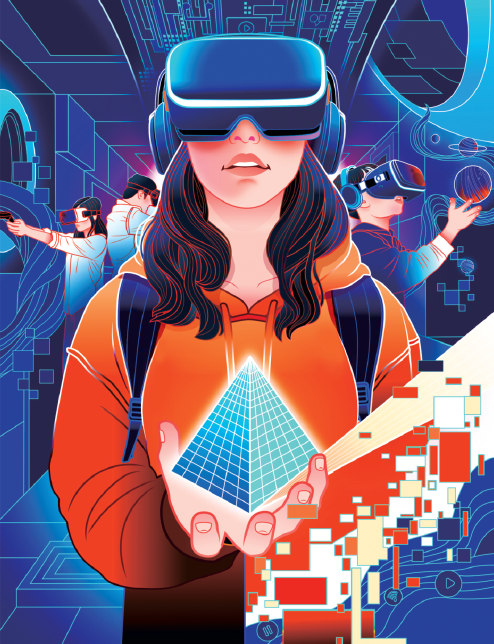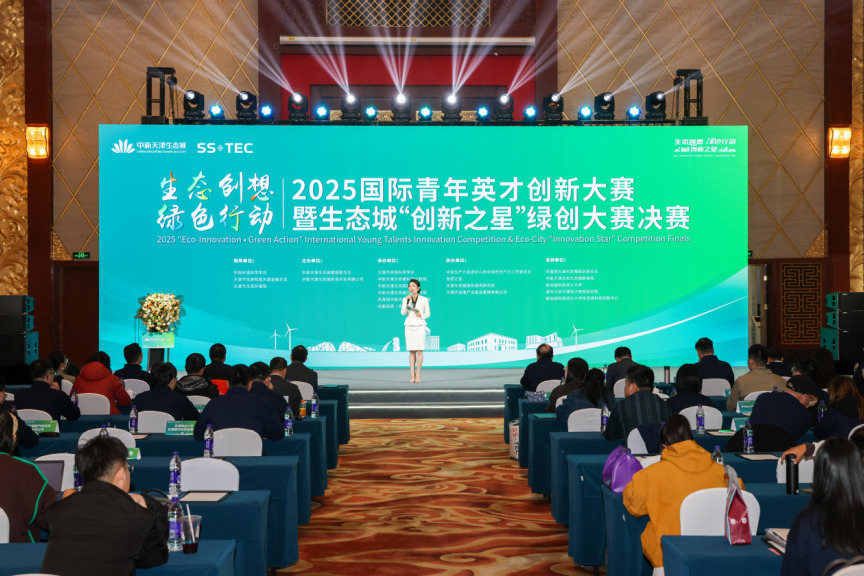Film and TV industry embracing VR


Guideline urges application of virtual technology in productions
In an answer to China's call for embracing the digital age, officials in the film and television industry have launched a series of guidelines to promote the application of virtual reality and augmented reality in the production of movies and TV shows in recent months.
Last November, the Ministry of Industry and Information Technology, the Ministry of Culture and Tourism, the National Radio and Television Administration, the Ministry of Education and the General Administration of Sport jointly released a five-year plan to boost the development of VR in various industries. According to the plan, the overall scale of China's VR industry — including hardware, software and applications — should exceed 350 billion yuan ($47.8 billion) by 2026.
The National Radio and Television Administration released a detailed guideline in September specifying 10 types of applications it encourages, including virtual production and digital avatars in filmmaking and TV shows to offer audiences more immersive experiences.
Cao Shumin, director of the administration, said that the annual output of China's TV drama series ranks first in the world, with about 56,000 production companies.
"Technologies such as virtual reality, AI and big data have been fully used in all processes of programs and dramas, including scriptwriting, shooting, producing and broadcasting. We're now accelerating the digital update of our whole industry to offer better experiences and services for audiences," Cao said at a news conference in Beijing at the end of September.
According to Li Fude, a veteran producer who has worked in the industry for about 20 years, VR has been warmly embraced by producers over the past three years due to COVID-19 prevention and control measures, which frequently confined people to their homes.
Li's company, Century UU, offers virtual production services for filmmakers. In 2017, the Tianjin-based company established a powerful virtual production space that allows actors to see various environments all around them while filming by viewing a series of massive LED screens that can display preprepared backdrops.
Over the past three years, 19 big-budget TV series have used Century UU's virtual production services. Li said that with the help of technology, it's possible for actors to perform in as many as 84 virtual environments in a four-day period.
"It's not only convenient and efficient, but also affordable," he said. "The technology can help a production company save as much as 30 percent on its filming costs."
He made a TV series Call Me Wuya last year with a Thailand production team. More than half the scenes shot relied on virtual production. Thanks to the technology, the team was able to shoot at a lower cost and with fewer crew members.
"With more people joining the virtual production industry, more production companies will be able to save on costs," Li added.
In fact, major production companies in China have already set up their own virtual production bases. Tencent, iQiyi and Youku, three leading streaming platforms in China, have all established such bases, with Tencent's base in Shenzhen, Guangdong province, iQiyi's in Jinhua, Zhejiang province, and Youku's in Beijing and several other cities.
For Reset, a hit Chinese TV suspense series produced by Tencent Pictures about people trapped in a time loop on a bus that's about to explode, nearly half the scenes were shot with the help of virtual reality. When a video showing how the series was shot aired on Tencent video, viewers expressed their surprise because they thought the scenes had been filmed in a real city in China.
Guo Fan, a filmmaker who earned his fame through his blockbuster franchise Wandering Earth, is a trailblazer in applying high tech in his films. In Wandering Earth II, he used AI and virtual reality to create a digital avatar to serve as the older version of the leading character. He also applied AI to mimic the voice of one of the actors in the film after the actor injured his vocal cords.
"It's an inevitable trend that our industry must face and accept. Virtual production will reform all the processes needed when we produce a film or drama," Guo said.
He and his team spent three months in the United States visiting video game companies, film studios and tech giants such as Google and Microsoft to learn how Hollywood is dealing with the digital age.
"After three months there, I can say that China's application of virtual reality and AI in the film and drama industry is as good as their counterparts in the US," said Guo, adding that Chinese officials acted very quickly to embrace technology reform.
Chen Hongwei, a veteran of the showbiz industry who has been closely observing emerging trends, agreed with Guo. Chen said that three years ago, virtual production and digital actors were concepts that many in the industry were not very familiar with. But now that the National Radio and Television Administration has published the guideline, they can learn more about related technology.
Last year, Chen co-produced a TV series for which he used a digital actress generated by a computer as "an experiment to try the new tech".
Chen said based on his talks with many showbiz insiders, most people are open to these avant-garde technologies. He said many filmmaking companies are also creating their own digital actors, which are seen as cheap and convenient, to further push the development of the technology in film and TV industry.
"I'm very excited about the digital age and can't wait to see what the future brings," he said. "The whole world is at the starting line, and we Chinese producers and filmmakers are taking action."
dengzhangyu@chinadaily.com.cn
- Liaoning holds ceremonies to commemorate CPV martyrs
- China honors first Commemoration Day of Taiwan's Restoration
- 5.5-magnitude quake jolts Hunchun, NE China's Jilin province
- World Laureates Forum awards intl scientific excellence in Shanghai
- Dazzling Liuyang fireworks festival sets night sky aglow
- China commemorates 80th anniversary of Taiwan's restoration





































